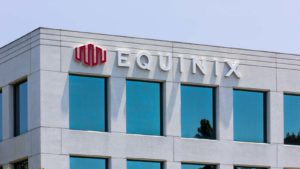Real estate investment trusts (REITs) are particularly appealing for income investors. REITs widely have high dividend yields, well above both the market average and most other market sectors. With the S&P 500 Index yielding just 1.7% on average, it is a good time for income investors to consider this type of investment.
The best REITs display a track record of growth, in addition to their sizable dividend yields. Data center REITs typically own properties that are a combination of data centers that store and process information, technology manufacturing sites and internet gateway datacenters.
This article will discuss three top data center REITs for investors to consider.
Digital Realty (DLR)

Source: dotshock / Shutterstock
Digital Realty (NYSE:DLR) owns more than 300 facilities in 28 countries on six continents. The REIT is a leader in the data center space. In the most recent quarter, revenue increased 19% year-over-year while core FFO-per-share was roughly flat year-over-year.
Acquisitions are a major component of Digital Realty’s growth strategy. In 2017, Digital Realty completed its purchase of DuPont Fabros Technology, a REIT that leased properties to some of the largest tech companies in the world. More recently, Digital Realty added Interxion, gaining exposure to the European cloud industry.
Digital Realty’s dividend payout ratio (using FFO instead of earnings) is comparatively low for a REIT. That should give shareholders confidence that the dividend is relatively safe. Digital Realty’s chief competitive advantage is that it is among the largest technology REITs in the world. This gives the REIT a size and scale advantage that competitors have difficulty matching. In addition, the company has proven to be able to utilize its balance sheet to fund acquisitions in order to grow FFO and revenues.
The REIT has increased its dividend for 17 consecutive years, including a 5% dividend hike in 2022. For 2023, the company expects to generate $6.65 to $6.75 (unchanged) in core FFO-per-share. This easily covers the dividend and should allow for continued increases. The stock yields 5%.
Equinix (EQIX)

Source: Ken Wolter / Shutterstock.com
Equinix (NASDAQ:EQIX) operates 248 data centers across 32 countries on six continents. It serves more than 10,000 customers. The REIT operates an attractive business model, as over 90% of its total revenue is recurring.
Its business services include colocation, interconnection, managed infrastructure and other. Its offerings allow customers to connect directly, securely and dynamically within and between other EQIX data centers around the globe. There are currently more than 452,000 total interconnections.
EQIX also has a highly diversified client base. This includes major telecoms, mobile and network service providers, cloud and IT service providers, and financial services companies.
Equinix reported first-quarter 2023 results on May 3. Revenue grew 15% year-over-year to $2 billion. The company has achieved 81 consecutive quarters of revenue growth. Adjusted funds from operations (AFFO) increased 21% year-over-year to $8.59. Interconnection revenue grew 9% year-over-year.
Equinix continues to expand on its platform and has 50 major projects in development across 37 markets. Management provided 2023 annual guidance and expects a roughly 13.5% increase in revenues to $8.23 billion. Guidance also calls for AFFO of roughly $2.97 billion, a 9.5% increase over 2022. They also estimate AFFO per share gains of 6.5% to $31.58.
EQIX has grown revenues for 20 years straight. Plus, the company’s bottom line has also been on a straight uptrend for over a decade. For the past nine and five years, Equinix has been able to grow its AFFO at an average annual rate of 10%.
Its major competitive advantage is its global platform spanning 32 countries. It contains the industry’s largest and most active ecosystem of partners in their centers, creating a network effect that improves performance and lowers cost for customers. The trust has an investment-grade S&P Credit Rating of BBB and a consolidated net-debt-to-adjusted-EBITDA of 3.4x. That is within the 3-4x range set by management.
EQIX is a strong REIT for dividend growth. On Feb. 15, Equinix announced a 10% increase to the dividend to $3.41 quarterly per share. It has increased its dividend for seven consecutive years. The payout ratio for EQIX is calculated as dividends per share divided by AFFO. The average five-year payout ratio of 43% is well-covered and leaves plenty of room for growth. Shares currently yield 2%.
Iron Mountain (IRM)

Source: Shutterstock
Iron Mountain (NYSE:IRM) is a storage and information-management REIT. Its services include record management, destruction, fulfillment services, data protection and recovery, server and computer backup services, and safeguarding of electronic and physical media.
Iron Mountain reported its fourth-quarter earnings results on Feb. 23. The trust announced that it generated revenues of $1.28 billion during the quarter, which was up 10% from the revenues that Iron Mountain generated during the previous year’s quarter. Normalized FFO-per-share of 74 cents was flat year-over-year. Margins were steady as well.
Iron Mountain is not a high-growth investment trust, but it still managed to increase its cash flows per share by 4% annually since 2009. Growth has been driven by several factors, with organic revenue growth through pricing increases being the most important one. Iron Mountain guides for 3% to 5% annual organic revenue growth in the future
Management announced its guidance for this year’s adjusted FFO-per-share with a range of $3.91 to $4, which represents solid growth of around 4% at the midpoint of the guidance range, relative to 2022, which had been a record year for the company.
Due to the weaker growth rate during the last decade, we use a somewhat lower estimate for Iron Mountain’s long-term cash-flow growth. Following a small profitability decline in 2019, Iron Mountain was able to grow its funds from operations to new record levels in both 2020, 2021 and 2022. It is expected that the company will be even more profitable this year. That growth will continue at a meaningful pace beyond the current year.
With a dividend payout ratio of approximately 63% for 2023 (based on FFO per share), the dividend appears secure. Shares currently yield 4.5%.
On the date of publication, Bob Ciura did not hold (either directly or indirectly) any positions in the securities mentioned in this article. The opinions expressed in this article are those of the writer, subject to the InvestorPlace.com Publishing Guidelines.

